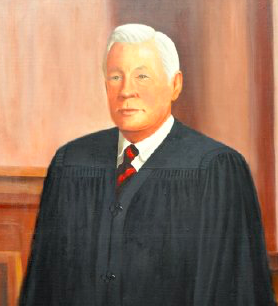To me, this is how an appellate judge should approach a case. Jurisprudence is a deeper thing than just a matter of logic and rules. The law is not about a bag of tricks, but a lot of lawyers think it is. They think it’s just a mass of complicated rules and regulations, and you read these things and bring them to a logical result. Law and jurisprudence are far deeper than that. A judge should constantly seek greater understanding and depth so that he comes to the decision of the case with a good philosophical background.
~ John S. Palmore
Commentary:
The rule of law must follow reason, if the the reason behind the rule is forgotten, the application of that law will produce unreasonable results, and the purpose of law has fallen short to the needs of the public.
Many may have forgotten the philosophical threads that tied the cases together through the passage of time. Steve Jobs described the problem succinctly that “You can’t connect the dots looking forward. You can only connect the dots looking backward.” However, legal philosophy and jurisprudence must look to the past with an eye to the future with feet in today. It’s a tough task, but the law grows as it must, but it must grow with the reason for which it serves — life and living.
I know I may be in the minority, and I know this is a tad off the beaten path, but the above quote weighed heavily on me in a day when just trying to get the extremists and others to follow the rule of law rather than pursue anarchy and a rule where the ends justify the means. But then, if there is such a significant sentiment afoot to end run the rule of law, then that would suggest that our current laws are following a philosophical bent that does not address the needs for today and is not anticipating the future.
I have no solution for that potential problem, but I do recall in Kentucky alone we had some great thinkers and thought leaders in jurisprudence. Some might suggest Palmore; others Liebson. We could use forward thinking today. A judge judges based upon the law. A justice does more with much more expected of him or her in the dispensation of justice.
So who is to pick up that mantle and fashion new ideas for new demands and future needs and where does it start?
Quite simply, change in the law begins where it has for millennia – at the ground level with lawyers and advocates to get the cases to the appellate judges and to the legislators. If the novel issues are not pursued with justice in mind and the current law as the foundation, they will not be addressed.
For example, comparative negligence in the law of torts is a given today, but I’m told that issue was pursued multiple times in the courts before it gained a foothold and became the law of the Commonwealth in Hilen v. Hays.
The following language should serve goto encourage the foot soldiers in the practice of law to think philosophically, to dare to stretch the limits of the law when an injustice is found, and to persevere in the face of resistance but knowing others will take that burden upon themselves until reason prevails.
In broad outline, stare decisis directs us to “stand by” our previous decisions unless there are sound legal reasons to the contrary. Every case must be decided with a respect for precedent. But the doctrine of stare decisis does not commit us to the sanctification of ancient fallacy. In Goetzman v. Wichern, 327 N.W.2d 742 (Iowa 1983), the Supreme Court of Iowa observed:
“(S)tare decisis does not preclude the change. That principle does not require blind imitation of the past or adherence to a rule . . . We must reform common law doctrines that are unsound and unsuited to present conditions. Id. at 753.
The common law is not a stagnant pool, but a moving stream. City of Louisville v. Chapman, Ky., 413 S.W.2d 74, 77 (1967). It seeks to purify itself as it flows through time. The common law is our responsibility; the child of the courts. We are responsible for its direction. In International News Services v. Associated Press, 248 U.S. 215, 39 S. Ct. 68, 63 L. Ed. 211 (1918), Mr. Justice Brandeis wrote:
“The unwritten law possesses capacity for growth; and has often satisfied new demands for justice by invoking analogies or by expanding a rule or principle.” 248 U.S. at 262, 39 S. Ct. at 81.
Mr. Justice Sutherland wrote in Funk v. United States, 290 U.S. 371, 54 S. Ct. 212, 78 L. Ed. 369 (1933):
“(T)o say that the courts of this country are forever bound to perpetuate such of its rules as, by every reasonable test, are found to be neither wise nor just, because we have once adopted them as suited to our situation and institutions at a particular time, is to deny to the common law in the place of its adoption a `flexibility and capacity for growth and adaptation’ which was `the peculiar boast and excellence’ of the system in the place of its origin.” 290 U.S. at 383, 54 S. Ct. at 216.


